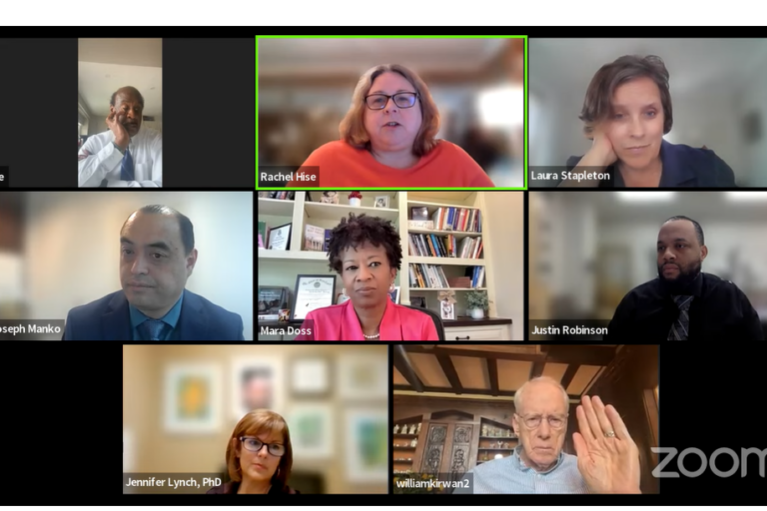
By Timothy Dale Williams II
The writer is a U.S. History teacher in the Prince George’s County Public Schools and is earning a Master’s degree in Strategic Communications at Trinity University.
My school district called a mandatory online meeting to address a new executive order that would take place immediately. The new executive order said that all teachers must refer to students using their preferred pronouns.
The online forum was designed to educate all teachers in our county on the importance of this new policy. Our school district had a panel of speakers to educate us on topics such as sexual and gender identity. The training sessions featured several former students who explained the importance of respecting the full range of LGBTQIA identities in the classroom. They gave us poignant personal testimonies detailing just how difficult it was for their gender identities to be accepted at school.
The training seemed to be positively received until I saw a few chat comments that exclaimed, “I am a Christian and this goes against my religion!” After a few more comments protesting the training appeared, supporters and detractors of the LGBTQIA community were involved in a full battle royal in the comment section of our professional training.
As I watched arguments and counterarguments fly in the comment section with lighting speed, I thought about my journey as a public-school teacher who was largely ignorant of the struggle and identities of my LGBTQIA students. The act of being publicly wrong about a topic is extremely frightening to me as a public-school teacher. Being wrong about a topic not only deflates my ego but, depending on the topic, it can have the effect of offending another person.
I work tirelessly to ensure that my classroom is a respectful and inclusive environment for all students. This is why I was mortified when a student wrote me a well-written short letter explaining how hurtful it was when I used the incorrect pronoun to refer to him back in 2019.
For the sake of privacy, we will refer to this student as Shelley. Shelley was a 9th grade student who was biologically female but identified as a male. Shelley told me this information during the first week of class, and I repeatedly got Shelley’s pronouns wrong when I was teaching in class. I was so focused on getting the details of my History lesson plan correct that I ignored the cherished identity of my student. The mistake was not on purpose, but the impact was still damaging.
“Did you listen to the great answer she said?” I subtly said to another student. At that moment, my classroom was not the respectful and inclusive environment that I claimed it to be.
After class, I read Shelley’s letter, which caused me to experience a range of emotions. I was initially surprised and shocked by the entire situation. I was a bit relieved because Shelley’s correction of my error was calm and respectful.
Still, I was ashamed of myself because my lack of knowledge caused me to disrespect a student. At that point in my life, I was largely ignorant of the unique struggles of those in the trans-gendered community. Beyond intense online debates on Caitlyn Jenner, I had not bothered to expose myself to the unique hardships of the trans-gendered community.
Shelley’s letter helped me empathize with the trans struggle in a powerful way. The letter helped make the issues of gender identity and equality for transgendered people real for me. Those subjects would no longer be far away and theoretical for me. Shelley’s letter eventually motivated me to get more informed on the nuances and struggles of the LGBTQIA community.
I started my education of the LGBTQIA community when I watched a documentary on Marsha P. Johnson, who was a Black Trans woman in the 1960s. She fought for equality for trans-gendered people during a period when there was much hostility towards both Black people and gender non-conforming people. Learning this history helped reorient my thinking on trans people and their struggles.
More importantly, it helped me not fail victim to the myth that the fight for LGBTQIA rights was only about protecting wealthy white people like Caitlyn Jenner. This false narrative is currently spread by numerous online commentators, who are hostile to the idea of transgender people.
I discovered the irony of this false narrative when I started to investigate the history of trans-gendered people across the world. The same white supremacy that caused racist whites to segregate schools based on race was the same white supremacy that attempted to invalidate the fluidity of gender and sexuality identities.
While it may seem like endless letters are being added to the LBGTQIA label, a deep dive into human history reveals just how fluid the idea of gender has always been in cultures around the world. For example, I researched how several Native American groups believed in a concept called “two-spirit,” which refers to individuals who have both male and female energies. I was amazed when I discovered this fact while preparing to teach a unit on U.S. westward expansion and Colonialism.
In this unit, I normally illustrated for my students the many ways white Europeans forced Native Americans to assimilate to white culture. I made them aware of the fact that numerous Native Americans were forced to attend public boarding schools, in which they were forced to learn English, cut their hair, and adopt a Eurocentric version of Christianity. I would mention the fact that many Native American cultures didn’t associate long with femininity.
But outside of this occasional reference, I tended to avoid the subject of sexuality and gender nonconformity in my classes. This was caused by a combination of fear and ignorance. I was in fear of offending colleagues, students, and parents who held “traditional beliefs.” I was in fear of getting facts wrong about individuals who were trans-gendered or gender non-conforming. I was in fear of the questions that I may face from students and parents who were critical of transgender people. I didn’t want to get into the fray.
As I studied and grew in knowledge, I realized that I had to take a stance on LGBTQIA issues to nurture the growth of all of my students. Long before our mandatory training, I realized that the fight to respect trans-gendered students in the classroom was an essential civil rights issue of our time. I am directly in the middle of one of the most important justice issues of our time every day as a public-school teacher.
I understand now why it’s important that I do more than just use the preferred pronouns of students in the classroom. I must be intentional about teaching students, colleagues, and parents to respect the identity of trans-gendered students. I plan on doing this by being intentional about highlighting the stories of LGBTQIA individuals throughout history in my class.
The concept of white supremacy has several branches that are still alive today. Being against gender and sexuality comes from the same tree that discriminates against me because I am a Black man. White Europeans in the 19th century labeled practices such as the ancient Hawaiian Hula dance evil because they didn’t understand it. Colonialism around the world involved labeling people, traditions, and beliefs white Europeans didn’t understand as evil or uncivilized.
As teachers, we should not want to repeat these harmful colonial practices on our LGBTQIA students. Are we teachers going to be on the side of justice or bigotry? Our students deserve to be in spaces where they are loved and respected.




 Creative Commons Attribution
Creative Commons Attribution